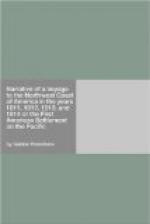The 18th was spent in getting in the remainder of the lading of the little vessel, and on the morning of the 19th we raised anchor, and dropped down abreast of the Kreluit village, where some of the Indians offering to aid us in the search after our deserters, Mr. Stuart put Mr. Farnham and me on shore to make another attempt. We passed that day in drying our clothes, and the next day embarked in a canoe, with one Kreluit man and a squaw, and ascended the river before described as entering the Columbia at this place. We soon met a canoe of natives, who informed us that our runaways had been made prisoners by the chief of a tribe which dwells upon the banks of the Willamet river, and which they called Cathlanaminim. We kept on and encamped on a beach of sand opposite Deer island. There we passed a night almost as disagreeable as that of the 17th-18th. We had lighted a fire, and contrived a shelter of mats; but there came on presently a violent gust of wind, accompanied with a heavy rain: our fire was put out, our mats were carried away, and we could neither rekindle the one nor find the others: so that we had to remain all night exposed to the fury of the storm. As soon as it was day we re-embarked, and set ourselves to paddling with all our might to warm ourselves. In the evening we arrived near the village where our deserters were, and saw one of them on the skirts of it. We proceeded to the hut of the chief, where we found all three, more inclined to follow us than to remain as slaves among these barbarians. We passed the night in the chief’s lodge, not without some fear and some precaution; this chief having the reputation of being a wicked man, and capable of violating the rights of parties. He was a man of high stature and a good mien, and proud in proportion, as we discovered by the chilling and haughty manner in which he received us. Farnham and I agreed to keep watch alternately, but this arrangement was superfluous, as neither of us could sleep a wink for the infernal thumping and singing made by the medicine men all night long, by a dying native. I had an opportunity of seeing the sick man make his last will and testament: having caused to be brought to him whatever he had that was most precious, his bracelets of copper, his bead necklace, his bow and arrows and quiver, his nets, his lines, his spear, his pipe, &c., he distributed the whole to his most intimate friends, with a promise on their part, to restore them, if he recovered.




